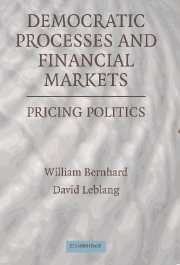Book contents
- Frontmatter
- Contents
- Acknowledgments
- 1 Introduction
- 2 Democratic Processes and Political Risk: Evidence from Foreign Exchange Markets
- 3 When Markets Party: Stocks, Bonds, and Cabinet Formations
- 4 The Cross-National Financial Consequences of Political Predictability
- 5 Cabinet Dissolutions and Interest Rate Behavior
- 6 Bargaining and Bonds: The Process of Coalition Formation and the Market for Government Debt in Austria and New Zealand
- 7 Time, Shares, and Florida: The 2000 Presidential Election and Stock Market Volatility
- 8 Polls and Pounds: Exchange Rate Behavior and Public Opinion in Britain
- 9 Conclusion: Political Predictability and Financial Market Behavior
- References
- Index
1 - Introduction
Published online by Cambridge University Press: 02 December 2009
- Frontmatter
- Contents
- Acknowledgments
- 1 Introduction
- 2 Democratic Processes and Political Risk: Evidence from Foreign Exchange Markets
- 3 When Markets Party: Stocks, Bonds, and Cabinet Formations
- 4 The Cross-National Financial Consequences of Political Predictability
- 5 Cabinet Dissolutions and Interest Rate Behavior
- 6 Bargaining and Bonds: The Process of Coalition Formation and the Market for Government Debt in Austria and New Zealand
- 7 Time, Shares, and Florida: The 2000 Presidential Election and Stock Market Volatility
- 8 Polls and Pounds: Exchange Rate Behavior and Public Opinion in Britain
- 9 Conclusion: Political Predictability and Financial Market Behavior
- References
- Index
Summary
Political processes – elections, cabinet formations, referenda, legislative debates – determine a government's economic policies, which, in turn, condition the environment for investment. By anticipating the results of these processes, savvy investors can re-allocate their portfolios to meet a changed policy context. Asset owners, therefore, have a keen interest in predicting political outcomes: Which party will win the election? Who will form the government? What will be the new government's policy priorities?
The collective decisions of investors, in turn, shape how markets respond to political processes. Whether markets react to political events in a systematic manner remains an open issue. Do asset prices behave differently when left parties are in office? Will the election of a particular candidate cause a run on the currency? Does divided government – where the executive comes from a different party than a majority of legislators – cause a market downturn?
The consequences of these market responses extend far beyond questions of portfolio allocation. The investment decisions of asset owners fundamentally shape economic performance. Shifts in asset allocation can sustain an economic upswing or cut-off growth. With the technological and financial integration of asset markets, price movements can cascade across borders and markets, creating a world-wide boom or a systemic crisis.
Changes in market conditions have distributional consequences as well. Economic actors reliant on the stock market for income – firms, pensioners, etc. – are vulnerable not only to falling equity prices but also to volatility in market returns.
- Type
- Chapter
- Information
- Democratic Processes and Financial MarketsPricing Politics, pp. 1 - 16Publisher: Cambridge University PressPrint publication year: 2006
- 1
- Cited by

